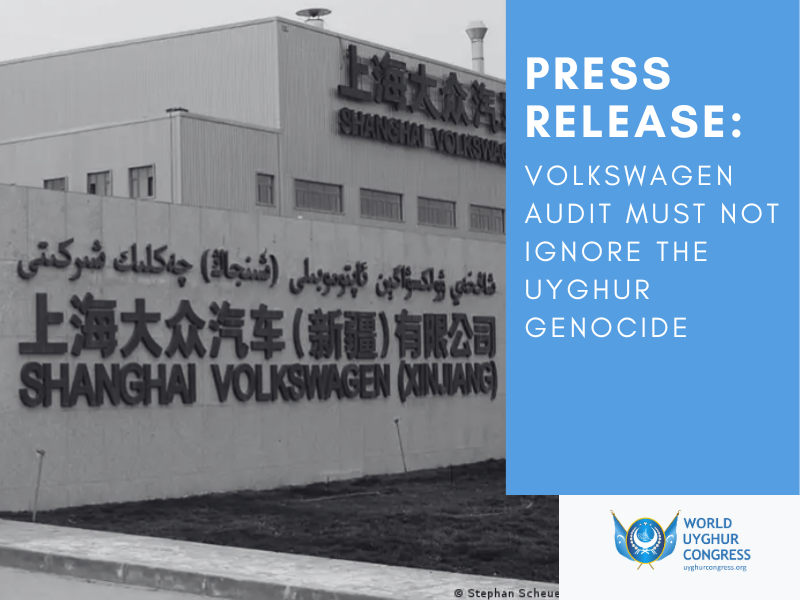PRESS RELEASE: VOLKSWAGEN AUDIT MUST NOT IGNORE THE UYGHUR GENOCIDE

Press Release – For immediate Release
06 December 2023
Contact: World Uyghur Congress www.uyghurcongress.org
+49 89 5432 1999 or [email protected]
- Credible and independent audit not possible in the Uyghur region
- Audit seems to ignore repressive political context
- Volkswagen must take effective and preventive measures against forced labour risks in the entire supply chain
On December 5, 2023, Volkswagen AG published the results of its long-awaited audit of the VW SAIC plant in Urumchi, the capital of the Uyghur region of Xinjiang/East Turkistan. The audit was to be carried out by the consultancy firm of the former Federal Government Commissioner for Human Rights, Markus Löning (Loening- Human Rights & Responsible Business GmbH), which commissioned a law firm in Shenzhen to carry out the audit. After months of announcement and registration, discussions were held with employees. According to Löning, these conversations at the factory revealed no evidence or proof of forced labour.
“In a region where millions of Uyghurs are under extensive surveillance and are indefinitely interned, tortured and severely abused for words or appearances that do not conform to Communist Party ideals, a credible, independent audit is simply not possible,” says Gheyyur Kuerban, Berlin Director of the World Uyghur Congress.” Everyone there knows that a wrong word can have life-threatening consequences for themselves or their families.”
Numerous international auditing firms such as TÜV Süd, Bureau Veritas and Worldwide Responsible Accredited Production (WRAP) no longer work in the Uyghur region. They are unable to carry out independent and credible audits there. According to Human Rights Watch, auditing companies have complained about extreme surveillance, the tracking of physical and digital movements and the use of facial recognition.
“It is outrageous that VW is operating a plant in this extremely repressive environment at all. The Wolfsburg-based company is thus providing the Chinese regime with a propaganda success in the hope of gaining better access to the Chinese market. The human rights of the Uyghur population of Xinjiang have fallen by the wayside. Leading auditing companies consider the region to be unauditable. Interviews with undoubtedly hand-picked employees cannot dispel the suspicion of forced labour in the company’s supply chains,” says Hanno Schedler, GfbV expert on genocide prevention and the responsibility to protect.
Mr Löning emphasises that the human rights situation in the Uyghur region remains a challenge. His mandate is limited to the factory, which is why his company cannot assess what is happening outside. In view of the comprehensive report by the UN High Commissioner for Human Rights, according to which the Chinese government’s actions can be characterised as crimes against humanity, this is not enough. Every audit must explicitly name and take into account these restrictions.
“The VW SAIC plant in the Uyghur region cannot be viewed in a detached way from the context of the genocide taking place there. Surveys of employees are essential for investigations into the human rights situation and the labour situation. However, they cannot provide reliable information if the interviewees testify in fear for their safety and that of their relatives,” says Gheyyur Kuerban, Berlin Director of the World Uyghur Congress. The audit is also limited to the plant in Urumchi. The supply chains of the VW Group, including its joint ventures, are not included. However, according to reports by Sheffield Hallam University and others, Uyghur forced labour is widespread in the VW supply chains.
“The audit published by VW diverts public attention away from the real issue: the serious problems of Uyghur forced labour in its supply chains, for which there is reliable evidence, continue to be ignored,” says Gheyyur Kuerban, Berlin Director of the World Uyghur Congress.
“The audit raises more questions than it answers. Rather, it seems to confirm the criticism that the plant is not being operated for economic but for political reasons. Above all, Volkswagen must respond to the indications of forced labour risks that relate to the supply chain in China, not just to the plant in Urumchi. So far, Volkswagen has failed to provide concrete answers as to how the Group intends to preventively identify, minimise and exclude forced labour risks at suppliers in China,” criticises Tilman Massa, Co-Managing Director of the umbrella organisation Kritische Aktionärinnen und Aktionäre. “If even a single audit at the joint venture partner is so difficult, without freedom of expression and trade union rights and can only be carried out in consultation, further audits can hardly be considered an effective measure.”
The results of the audit must not serve VW as an excuse. Volkswagen should disclose the results in full. The company must also explain how it intends to exclude Uyghur forced labour in all its supply chains, including those of its joint ventures. In addition, Volkswagen’s investors, in particular the state of Lower Saxony, should make this clear to the VW Board of Management and demand further measures.
Contacts:
Gheyyur Kuerban, Berlin Director World Uyghur Congress, +49 176-80569329, [email protected]
Tilman Massa, Co-Managing Director of Kritische Aktionär*innen, Tel.: 0221 599 56 47, [email protected]
Hanno Schedler, Consultant for Genocide Prevention and Responsibility to Protect at the Society for Threatened Peoples, 0551/49906-15, [email protected]

